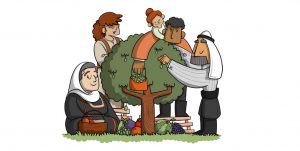Building the new: Reimagining civil society resourcing in times of global transformation
25 Sep 2025
Join us on 30 October for a conversation about what is possible – and already happening – now, and to imagine how we can build the new, together.
Around the world – from Palestine to India, Serbia to Indonesia – communities are showing remarkable creativity, finding new ways and reviving old traditions to endure, resist and thrive. Their efforts feel all the more vital in an era of unprecedented global challenges, when traditional funding models and NGO structures are proving inadequate, extractive and disconnected from grassroots realities. They remind us that liberation cannot be outsourced.
What becomes possible when we stop seeing resources as charity and start seeing them as solidarity: grounded in dignity, local ties and collective imagination?
This will be a global, peer-led conversation born from this belief. Together we will explore:
- How can we resource movements that centre human dignity and community over institutional survival?
- What structures can help communities reclaim agency when external systems have eroded their autonomy?
- Which alternative models – of funding, organizing and mutual care – are already alive around the world?
We will draw inspiration from Al-Ouneh, the Palestinian tradition of collective labour built on kinship and trust, from India’s micro-level resourcing amid shrinking civic space, from Serbia’s leaderless movements organizing under authoritarianism, and from efforts in Indonesia to build an alternative economic base for social movements.
Date: Thursday 30 October 2025
Time: 10h UTC / 10h GMT (UK) / 11h CET (Serbia) / 12h EET (Palestine) / 15h30 IST (India) / 17h WIB (Indonesia)
Peer-led dialogue with:
- Marko Aksentijević, Ministry of Space (Serbia)
- Kamala Chandrakirana, Indonesia for Humanity (Indonesia)
- Martin Macwan, Dalit Shakti Kendra (India)
- Nour Nusseibeh, Dalia Association (Palestine)
Facilitated by: Jenny Hodgson, GFCF
Co-hosts: Bridging Dialogues, Dalia Association and the GFCF


